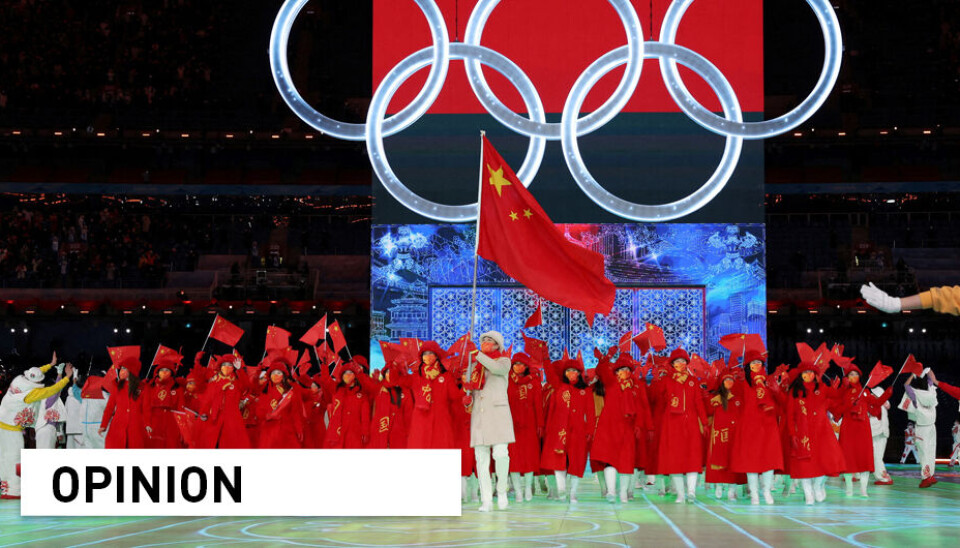Opinion:

Beijing Olympics 2022:
The controversies posing hidden risks for China and the IOC
OPINION: The International Olympic Committee risks alienating democracies who expect the organization to live up to its values instead of serving modern autocracies’ economic and nationalistic interests.
On 4 February the “simple, safe, and splendid” Winter Olympic Games 2022 were solemnly inaugurated at the Bird’s Nest Olympic Stadium in Beijing. Olympic Games are hallmark events for all hosting cities. But this year’s Games will arguably go down in history as one of the most contested, thus bearing significant risks for both the Chinese Communist Party (CCP) and the International Olympic Committee (IOC).
A poster child for promoting advanced cultural economy
According to the South China Morning Post, Winter Olympic Games are 40 to 50 per cent of the size of Summer Games in terms of countries competing, revenues from sponsorship and television, and other metrics. Nevertheless, the social and political connotations of the former are unevenly higher, writes Jung Woo Lee in his article in the International Journal of the History of Sport.
Due to the high economic and cultural barriers to winter sports, they carry an elitist character. With a few exceptions, Winter Olympic Games have been hosted by affluent western winter sports destinations, such as Cortina d’Ampezzo, Innsbruck, Lillehammer, Salt Lake City, and Vancouver. Thus, the Beijing Olympics 2022 serve the Chinese Communist Party to emphasize not only its world power status but also its desire to join the club of advanced cultural economies.
This year’s Games carry historical importance indeed. Beijing is the world’s first dual Olympic City, meaning that for the first time in history, a city has hosted both the Summer and Winter Olympic Games. This fact demonstrates China’s diplomatic aptitude and political leverage within the IOC. Nevertheless, the Games’ run-up has been accompanied by a host of controversies.
Human rights
Human rights have undoubtedly dominated media coverage over the past months. The critique that the Olympic Games, which propagate universal values of mutual respect, equality, peace, and freedom, are hosted in a country whose political regime heavily restricts freedom of expression, jails activists and journalists, and suppresses ethnic minorities and their cultures is not new.
However, the term “Genocide Olympics,” which during the preparations for the 2008 Games referred to China’s indirect involvement in the atrocities in Darfur through arms sales, has taken on a new meaning. It now stands for the Chinese government’s own harsh ethnic policies in its Western Province Xinjiang, where it has been accused of operating forced labor camps and imposing sterilization on the local ethnic Muslim community, the Uighurs.
In addition, observers worldwide criticize China's deployment of a “closed-loop system” for containing Covid-19 infections as a pretext to toughen further restrictions and control over large parts of Chinese society. Just a few days before the official opening ceremony, Chinese and foreign media reported that authorities declared the residential district Anzhanli adjacent to the Olympic Stadium as a high-risk area, putting all residents into strict quarantine because of seven Covid-19 infections that occurred over the past two weeks.
Freedom of the press
During all events of high political importance in China, media contents are highly surveyed, and negative news is suppressed. In his research Briar Smith expands that China, in connection to the 2008 Olympics, temporarily relaxed restrictions for foreign journalists “to nurture a more positive international image and present a confident and benevolent China”. But this time, China did not make such concessions.
Existing ski resources already gulp water supplies of Beijing residents and agricultural producers that live in the area.
In response, the Foreign Correspondents Club of China (FCCC) issued an official statement in November. Addressing Chinese authorities and the IOC, the association warned that border restrictions in place since March 2020 and delays granting new visas for reporters have decimated media coverage on China and the preparations for the Olympic Games, thus “depriving the world of informative coverage across China”.
Environmental sustainability
Although environmental degradation remains dramatic and China’s reliance on coal makes it a frequent target of international criticism, its trajectory over the past two decades deserves acknowledgment. Unsurprisingly, the Chinese Communist Party has not forgone this occasion to showcase its capacity to make the Winter Games purportedly the “greenest events in the Olympic Games’ history”. According to the recently released Pre-Games Sustainability Report, a series of measures were put into place, such as the use of renewable energy, carbon compensation, and biodiversity protection measures.
However, scientists have long questioned the environmental impact of the Olympic Games. During the Tokyo Olympic Games in 2021, media coverage of environmental protection and carbon emission reduction measures was rife. Yet, various investigations by NGOs and a recent study published in Nature attest that “sustainability rhetoric does not match actual sustainability outcomes”. In order to make such big events sustainable, it is necessary to downsize the event significantly, rotate the Olympics among the same cities, and install an independent body to develop, monitor, and enforce credible standards.
Reality mismatch
Against this backdrop, prospects look dim that Beijing’s official rhetoric will match (measurable) reality. The Games were admittedly rotated back to Beijing. But due to their central role in the Chinese Communist Party’s nationalistic propaganda, they did not remain “simple”. An investigation by journalists from the Insider reveals that, contrary to Beijing’s official declaration to host the games at a budget-friendly cost of US$ 3.9 billion, total investment reached US$ 38.5 billion, most of which was spent on infrastructure. Also, as pointed out in the FCCC’s statement, foreign journalists lack access to verify sustainability claims.
Finally, the fact that Zhangjiakou, a city 200 kilometers northeast from Beijing and one of the Winter Games’ venues, is arid and relies 100 per cent on artificially produced snow does not speak for the long-term environmental sustainability of the skiing industry planned in this region. Existing ski resources already gulp water supplies of Beijing residents and agricultural producers that live in the area, according to an article by Ian Johnson in the New York Times from 2015.
Polarization and alienation
The high degree of controversy and the apparent mismatch between principles and operational realities are risks that neither the Chinese government nor the IOC should underestimate. They further aggravate the already strained international relations and China’s tarnished image abroad. Both cannot be in the interest of the Chinese government and the Chinese people.
Moreover, the IOC provokes long-lasting reputational damage. The fact that it had a hard time finding a host for the Winter Games, as many cities were too small to host an international event of this magnitude and public opinion in many democracies disapproved of participation in the bid, should serve as a wakeup call.
The IOC risks losing its claim of universality and alienating a big share of people in democracies who expect the international organization to live up to its values instead of serving modern autocracies’ economic and nationalistic interests.
Share your science or have an opinion in the Researchers' zone
The ScienceNorway Researchers' zone consists of opinions, blogs and popular science pieces written by researchers and scientists from or based in Norway. Want to contribute? Send us an email!




























